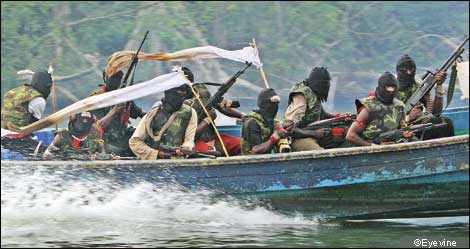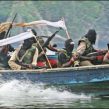
Nigeria’s Navy Struggles with Attacks on Offshore Oil Facilities
Publication: Terrorism Monitor Volume: 6 Issue: 14
By:

Movement for the Emancipation of the Niger Delta (MEND) militants reportedly attacked Royal Dutch Shell’s Bonga platform and its attendant Floating, Production, Storage and Offloading (FPSO) vessel 75 miles off the Nigerian coast in the Gulf of Guinea on June 19. The assault shut down the vessel’s 225,000 barrel per day production and the following day Royal Dutch Shell declared force majeure [1] on its June and July oil exports from the facility—which was only lifted on July 9—while force majeure on another Royal Dutch Shell site, Bonny Light, remains in place (Tradingmarkets.com, July 9). Given its distance from the coast, the Nigerian government had before the attack considered the facility beyond the reach of militant groups. Two days after the assault the Nigerian government dispatched two naval vessels to the site, including the Nigerian Navy’s sole frigate, NNS Aradu, but analysts noted that they would only have a dissuasive effect, as the warships were not sufficiently mobile to catch the MEND speedboats, which are capable of outmaneuvering the Nigerian warships (Vanguard [Lagos], June 26). The office of President Umaru Musa Yar’Adua issued a statement noting: “The President has further directed that security be beefed up at all oil facilities and installations in the Niger Delta to forestall further acts of terrorism by criminal elements in the region” (Saturday Tribune [Ibadan], June 26).
While Nigeria’s onshore oil facilities have been subjected to attacks since 2004, the Bonga attack is the first significant assault on a Nigerian offshore oil site, and represents an ominous escalation in Nigeria’s ongoing battle with militants. The attack is also part of a larger pattern of increasing maritime attacks against shipping and oil facilities from Somalia to the Persian Gulf, producing a security problem for which regional navies have yet to develop coordinated responses.
Cause of the Bonga Attack Disputed
What happened at Bonga remains unclear; while MEND claimed responsibility for the attack, other reports claim that the FPSO was the victim of internal sabotage carried out by a naval retired officer, as related by “authoritative sources” to a leading Nigerian newspaper, one of whom said: “It was not a militant action at all” (Vanguard, June 28). According to the source, the incident occurred when 55 security personnel, members of a private security outfit operated by a retired senior naval captain, deliberately shut down the FPSO to protest Shell’s treatment of Nigerian workers and the non-payment of salaries. In the same journal a MEND commander disputed the claim, asserting that his group carried out the attack.
Whatever the truth of the disruption, Nigeria is the largest oil producer in Africa, the world’s 11th largest producer of crude oil, a member of the Organization of Petroleum Exporting Countries (OPEC) and the fifth largest exporter to the United States, but since December 2005 onshore pipeline attacks and the kidnapping of oil workers in Nigeria’s delta oil facilities have cut production by nearly a quarter. Of Nigeria’s 2.3 million bpd production, the Bonga attack, combined with others, cut Nigerian production by 900,000 bpd, causing analysts to comment that the assaults were a major factor in pushing crude prices above $145 a barrel. Besides the loss of Bonga’s 220,000 bpd, other 2008 shutdowns include Brass River Eni (45,000 bpd) Bonny Light Shell (164,000 bpd), Forcados Shell (160,000 bpd), EA Shell (115,000 bpd), Escravos Chevron (120,000 bpd) and Pennington Chevron (50,000 bpd) (Dallas Morning News, July 8).
Nigeria’s Bonga oilfield is located in Nigeria’s offshore OPL 212 block at depths of more than 3,200 feet. Bonga, Nigeria’s first deep-water oil discovery and estimated to hold recoverable oil reserves of 600 million barrels, began production at the end of 2005, with output rising to 225,000 bpd in April 2006. Oil from the Bonga field is stored in a FPSO unit with a capacity of two million barrels.
In an ironic twist, the Bonga field was the first of a number of deepwater projects planned to boost Nigerian oil production by allowing multinational oil companies to avoid the rising security risks in the unstable Niger Delta region. The Nigerian government held its first licensing round of offshore sites in March 2005, offering a total of 77 deepwater and inland blocks. Two years later the Nigerian government offered an additional 44 blocks for development.
As of January 2007, Nigeria had 36.2 billion barrels of proven oil reserves, and the government plans to expand its proven reserves to 40 billion barrels by 2010. The Nigerian economy is heavily dependent on the oil sector, which accounts for 95 percent of the country’s total export revenues (U.S. Energy Information Administration, www.eia.doe.gov).
Whatever solution to the attack that Royal Dutch Shell develops, it will shortly be needed beyond the Bonga site, as in August Royal Dutch Shell plans to bring online its Gbaran-Ubie field, located offshore of the eastern delta. Gbaran-Ubie’s projected production capacity of 220,000 bpd rivals that of Bonga.
Capabilities of the Nigerian Navy
Constant patrols of both Bonga and Gbaran-Ubie would severely strain the Nigerian Navy’s resources, which currently consist of the NNS Aradu frigate, the NNS Enymiri corvette (F 83), the NNS Ohue and Marabai coastal minesweepers, the NNS Siri, Ayam, and Ekun missile boats and four Balsam ocean patrol craft [2]. The Nigerian Navy is already overstretched, as the country’s coastal waters extend over 500 miles from the eastern Cameroonian border to Nigeria’s frontier with Benin, a few miles west of Lagos. The Niger Delta, bisecting the country’s southeastern and southwestern coastline, is a nightmarish “brownwater” thicket of more than 3,000 rivers, rivulets, swamps and lakes.
What seems inevitable is that the United States, currently Nigeria’s biggest oil importer, will be drawn into the fray, as Washington expects its oil imports from the Gulf of Guinea to increase to more than 25 percent by 2015. On February 6, 2007, the Pentagon established its AFRICOM military command to oversee the deployment of U.S. forces in the area and supervise the distribution of money, material and military training to regional militaries and client states.
On June 28 Nigerian Vice President Goodluck Jonathan received a delegation of six United States Congressmen in Abuja led by Howard Berman, chairman of the U.S. House of Representatives Committee on Foreign Relations and solicited Washington’s assistance in pacifying the volatile Delta region, saying: “It will therefore be welcomed if the U.S. Government will assist Nigeria in curbing the criminalities within the area, since the U.S. has its security installations in the Gulf of Guinea, protecting its investments situated there” (The Tide [Port Harcourt], June 30). Nor is possible U.S. assistance all—British Prime Minister Gordon Brown will meet President Yar’Adua in London on July 17, with British press reporting that oilfield security will head the agenda.
MEND has stated that it is willing to negotiate an end to hostilities if the Nigerian government frees its leader, Henry Okah, but that seems currently unlikely, as on July 7 Nigeria’s Federal High Court reserved until July 18 a ruling on a motion by the prosecution to increase the treason and gunrunning charges against Okah from 55 to 62, even though President Yar’Adua is trying to broker a negotiated settlement (Vanguard, July 8). In May MEND’s leadership called on former U.S. President Jimmy Carter to mediate peace talks between MEND and the government.
Other Threats to Offshore Oil Production
Nor is MEND Nigeria’s only maritime threat—piracy is now on the increase. From January to March, the International Maritime Bureau (IMB) logged 10 incidents in Nigerian waters, more than 20 percent of the world’s total. The IMB warned three months ago that violence, fueled by increasing MEND attacks, was “spiraling out of control.”
British Prime Minister Brown has already proffered assistance; at Saudi Arabia’s oil summit last month Brown said that Britain would “support Nigeria, Iraq and others seeking to overcome security constraints on increased production.”
The end result of the rising unrest is that Washington’s AFRICOM, currently orphaned in Stuttgart, might finally acquire a home on the Dark Continent. American maritime firepower in Africa to protect rising American oil imports would dovetail neatly with current administration policy; in his 2006 State of the Union address President George W. Bush announced his intention “to replace more than 75 percent of our oil imports from the Middle East by 2025.” It is not as if Nigeria can allow its oil industry to deteriorate, as it currently provides 20 percent of the nation’s GDP, 95 percent of its foreign exchange earnings and 80 percent of budgetary revenues.
Conclusion
MEND has dismissed AFRICOM, saying it typifies American braggadocio “which has no place in the realism of living in today’s world.” After meeting President Bush in the White House on December 13, Yar’Adua announced that Nigeria had resolved to partner with AFRICOM “to actualize its peace initiatives and security on the continent.” The comment ignited a political firestorm in Nigeria, with the opposition Action Congress chastising Yar’Adua for “elevating expediency over Nigeria’s sovereignty” by endorsing AFRICOM in return for U.S. recognition of his government, causing Yar’Adua to clarify his remarks by stating that he did not endorse AFRICOM’s presence in Nigeria. Next month however, when Gbaran-Ubie comes online, Abuja may be unable to resist the Pentagon’s blandishments if it does not want to risk having 425,000 offshore bpd production off-lined by further militant attacks.
Notes
1. Literally “greater force.” A clause in contracts that releases a party from obligation or liability due to extraordinary events or circumstances.
2. Military Balance 2007, International Institute of Strategic Studies, London.




